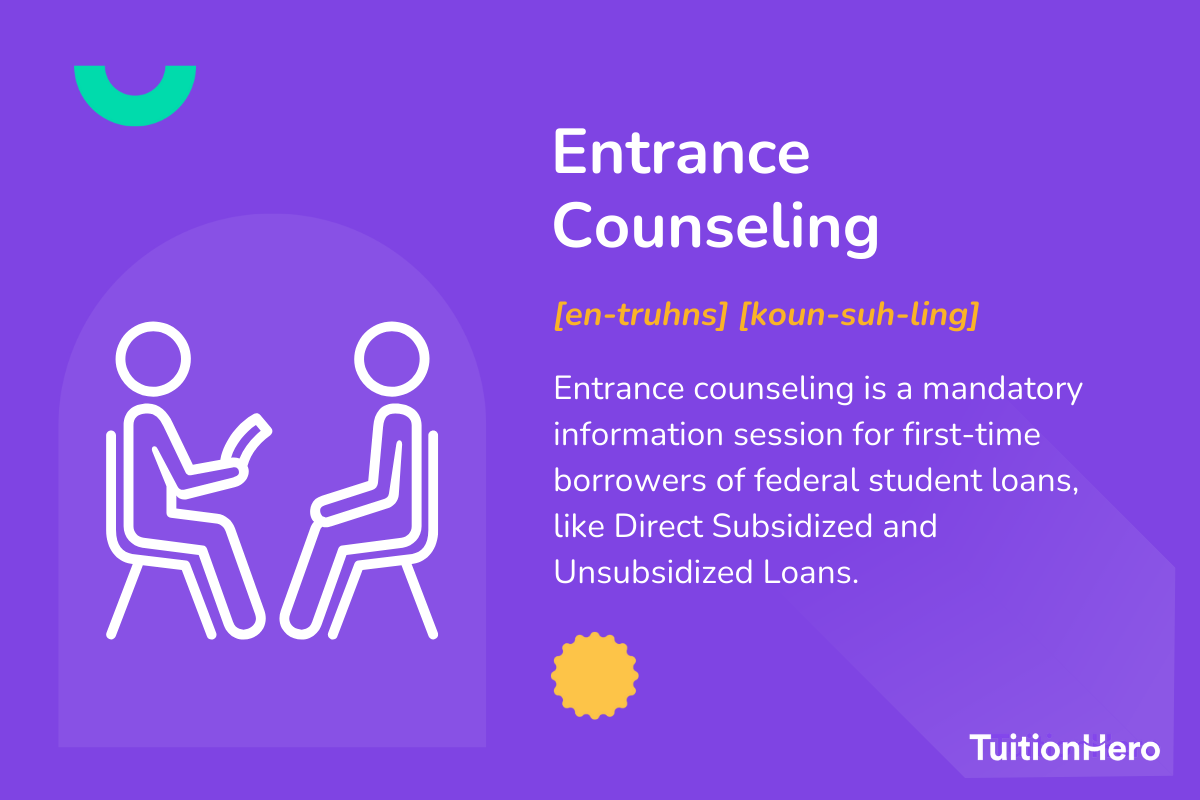Advertiser Disclosure
Last update: November 17, 2024
5 minutes read
What Is College Entrance Counseling?
Ever wondered what college entrance counseling is and why it's important for students? Learn how it affects your financial future and loan management.

By Derick Rodriguez, Associate Editor
Edited by Yerain Abreu, M.S.
Learn more about our editorial standards



By Derick Rodriguez, Associate Editor
Edited by Yerain Abreu, M.S.
Learn more about our editorial standards
In today's busy world, it's essential to understand college finance. Students often talk about student loans and financial aid, but not many discuss college entrance counseling. Let's clear up some confusion about entrance counseling and make sure students and parents understand its importance. If you're thinking about your future finances, looking into ways to refinance your current student loans can help make your repayments more manageable.

Key takeaways
- Entrance counseling is mandatory for first-time federal student loan borrowers
- It equips students with financial management skills, from budgeting to understanding loan repayment options
- Completion is a one-time requirement per educational level unless transitioning from undergraduate to graduate loans
What is college entrance counseling?
College entrance counseling is an essential step for prospective college students, particularly those applying for federal student loans for the first time. It’s a 30-minute online workshop designed to help you understand how student loans work, covering everything from repayment options to how to manage your finances effectively while in school.
It's a fundamental part of your college preparation. At its core, entrance counseling equips you with the knowledge you need to make informed decisions about borrowing and repaying student loans.
You'll cover key areas like budgeting, building credit, understanding loan terms, and the implications of loan interest and default. Plus, it's an opportunity to learn about federal repayment plans, which could affect your financial strategy post-graduation.

You can complete your entrance counseling through StudentAid.gov, ensuring you're well-informed before your loans are disbursed. Here's what you need to know:
- How federal student loans work
- Many repayment plans and finding one that suits your needs
- Budgeting for your education costs
- The effect of interest on your student loans over time

TuitionHero Tip
This process doesn’t just prepare you for the financial aspects of college life but also provides a foundation for solid money management skills that will help you well beyond graduation.
When is student loan counseling required?
Before diving into the specifics of loan counseling, it’s important to understand when this process becomes a requirement for students. If you're a first-time borrower of federal student loans, student loan entrance counseling isn't just recommended—it's mandatory.
This requirement is in place to make sure you fully understand the details and responsibilities that come with accepting federal student loans. For undergraduate students eyeing their first Direct subsidized or unsubsidized loan, this process is a one-time requirement.
Graduate students entering Grad PLUS loans will have to go through entrance counseling again, even if they did it before for undergraduate loans. Parents taking out a PLUS loan for their child usually don't have to do this unless they have a bad credit history.
What are the benefits of student loan counseling?
Student loan counseling is a powerhouse of information that prepares you not just for the years during college, but for financial well-being long after graduation.
- Improves understanding of loans: It explains the terms, conditions, and responsibilities associated with borrowing.
- Prepares for financial management in college and beyond: Offers essential lessons in budgeting and credit building.
- Informs about repayment plans: Helps in making informed decisions about the best repayment strategy post-graduation.
- A measure against delinquency and default: Teaches about the consequences of missing payments and how to prevent them.
- Makes informed borrowing decisions easier: By understanding the total cost of education, borrowers can make strategic borrowing decisions.
What happens if you need to redo or update entrance counseling?
In some cases, students might wonder about redoing or updating their entrance counseling. It's rare, but situations can happen where a refresher or update is necessary.
However, for most students, once you've completed entrance counseling for your current degree level, there's no need to go through the process again unless you transition to a new level of education, like moving from undergraduate to graduate studies. If there are any updates to your financial situation or federal regulations, staying informed through your school's financial aid office and resources like TuitionHero.org is a smart move.
Compare private student loans now
TuitionHero simplifies your student loan decision, with multiple top loans side-by-side.
Compare Rates
Dos and don'ts of completing student loan entrance counseling
Student loan entrance counseling might seem confusing, but we want to make it easier for you. To help, we'll tell you what to do to make the most of it and what to avoid. This advice is here to make your counseling session straightforward and helpful.
Do
Do prepare your necessary documents in advance.
Do set aside uninterrupted time to complete the process.
Do actively engage with the content and take notes.
Do use the resources provided to plan your financial future.
Do check with your financial aid office if you have any questions post-counseling.
Don't
Don't rush through the modules.
Don't skip over sections you think aren't relevant.
Don't hesitate to ask for clarity on confusing topics.
Don't ignore your budgeting and credit-building lessons.
Don't forget to update your school if your financial situation changes.

Why trust TuitionHero
At TuitionHero, we simplify college finances. We provide resources to learn about federal student loans and scholarships. Our platform connects you with lenders for private student loans and refinancing. We offer tools to understand entrance counseling requirements.
Frequently asked questions (FAQ)
Entrance counseling is important for federal student loan borrowers, but it can also be helpful for those thinking about private student loans. The basic ideas about managing loans, budgeting, and financial planning shared during counseling apply to everyone. This information helps students make smart choices, no matter where their loans come from.
If you switch to a different school after finishing entrance counseling, your new school should be able to check if you completed counseling through the Department of Education's systems. But, it's important to double-check with your new school's financial aid office to make sure everything is in order and there won't be any problems getting your loan funds on time.
Yes, TuitionHero helps students and parents with education. If you're deciding about your child's education or thinking of going back to school, we can help.
Our resources can help you find scholarships, understand FAFSA, and choose the right loans for students or parents. We're here to support you with the financial side of education.
Final thoughts
Starting college can be tough, especially when it comes to money. Entrance counseling is a helpful guide that teaches you how to handle student loans.
At TuitionHero, we're here to help you even more. We have tools to help you find the right loans for school, whether they're private student loans or refinancing options.
Remember, knowing your options is key to making smart choices for your education and money goals. Explore our resources on managing student loans effectively to start your journey on the right foot.
Source
Author

Derick Rodriguez
Derick Rodriguez is a seasoned editor and digital marketing strategist specializing in demystifying college finance. With over half a decade of experience in the digital realm, Derick has honed a unique skill set that bridges the gap between complex financial concepts and accessible, user-friendly communication. His approach is deeply rooted in leveraging personal experiences and insights to illuminate the nuances of college finance, making it more approachable for students and families.
Editor

Yerain Abreu
Yerain Abreu is a Content Strategist with over 7 years of experience. He earned a Master's degree in digital marketing from Zicklin School of Business. He focuses on college finance, a niche carved out of his journey through the complexities of academic finance. These firsthand experiences provide him with a unique perspective, enabling him to create content that's informative and relatable to students and their families grappling with the intricacies of college financing.
At TuitionHero, we're not just passionate about our work - we take immense pride in it. Our dedicated team of writers diligently follows strict editorial standards, ensuring that every piece of content we publish is accurate, current, and highly valuable. We don't just strive for quality; we aim for excellence.
Related posts
While you're at it, here are some other college finance-related blog posts you might be interested in.
Shop and compare student financing options - 100% free!

Always free, always fast
TuitionHero is 100% free to use. Here, you can instantly view and compare multiple top lenders side-by-side.

Won’t affect credit score
Don’t worry – checking your rates with TuitionHero never impacts your credit score!

Safe and secure
We take your information's security seriously. We apply industry best practices to ensure your data is safe.
Finished scrolling? Start saving & find your private student loan rate today





